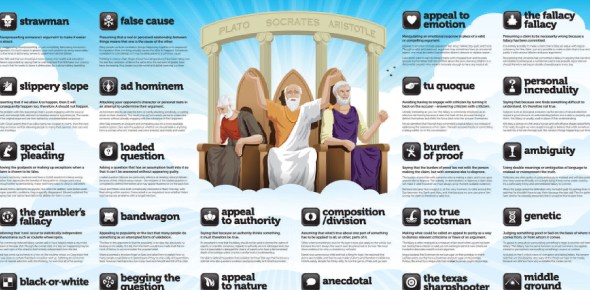

When you use business jargon, you dilute your meaning with phrases that have become empty and dull through overuse. Logical fallacies weaken you arguments, but there are other indicators that could show your points are unfounded. That straw man’s purpose is to distract now, the person who created the straw man fights that weakened distortion, instead of the actual argument. The name “straw man” refers to the weakness of the distorted argument it has as much power to stand as a bundle of straw, or a scarecrow, does. Politician 2: I guess you don’t care about our military then-nor do you care about our national safety.Politician 1: It would be irresponsible for me to vote to increase the military budget when we are facing such a national financial crisis.That’s a rather minor example, but the straw man fallacy is popular among politicians where bigger stakes are at play. Person 2: Why do you hate Chinese food? I guess you just don’t appreciate food from Asian cultures.Person 1: I think I’d rather have a burger than lo mein for lunch.Person 2 creates a distorted version of the claim (this is the straw man) and then attacks that distorted version as a way of seemingly attacking Person 1’s initial claim.Straw man fallacies distort a person’s argument and attack that distortion in order to distract from the actual issue at hand. 10 Common Logical Fallacies and Examples 1. This list of ten common logical fallacies will help you get your critical thinking radar up, so you can avoid offering or falling for logical fallacies. When you recognize logical fallacies in others’ arguments, you prevent yourself from being misled. Why Recognizing Logical Fallacies Is Importantīeing able to recognize common logical fallacies in your own arguments gives you the opportunity to change course before you damage your credibility. If accidental, their presence indicates that you lack critical thinking skills and cannot recognize the weaknesses in your own arguments. If intentional, they indicate you don’t have substantive arguments to offer and that you are willing to resort to manipulative techniques. Whether intentional or accidental, using logical fallacies ultimately damages your credibility. Including logical fallacies in your arguments accidentally is also problematic. While using logical fallacies intentionally as comedy is fine-no one is trying to deceive or mislead the audience who is “in on the joke”-using them intentionally to distract or mislead is irresponsible and dishonest. When the deliverer of the argument knows it’s ridiculous, the effect can be entertaining. Logical fallacies can also be used as a source of humor. Their bold, distracting arguments can work! Logical fallacies are popular in politics and advertising, but also appear in our personal conversations, as the frantic teenage driver-to-be reminds us. Logical fallacies are an easy way to strike a blow at an opponent or an opposing idea. Are as many people facing health consequences from consuming inorganic food as there are facing health consequences of smoking? Why Do People Use Logical Fallacies? While organic food may be a healthier option, to compare consuming inorganic food to inhaling dangerous carcinogens is an irresponsible reach. The organic food ad argues that eating non-organic food is on the same level as smoking. You let your kids eat non-organic food? You might as well let them smoke cigarettes.Even if you never pass the test (which is unlikely), you can use public transportation! This far-fetched outcome is easily dismantled with some perspective: If you fail the test, you take it again.
Red herring logical fallacy book driver#
The hopeful teenaged driver lets panic overtake reason, arguing that the driving test results will determine all future success or failure in their life.


I’ll never make any money or be able to take care of myself and will have absolutely no future. If I don’t pass my driving test, I won't be able to get to a job.Whether her college of choice was “second-rate” or not, that detail isn’t relevant to her mayoral policies. Rather than provide a legitimate reason why Meg Jones isn’t a good choice for mayor, the sign throws a cheap shot insulting her education. They are based on a faulty and unreasonable sense of logic or manipulated evidence, though they are often presented with energy and conviction. Logical fallacies are defective, even dishonorable, arguments. Solid arguments can stand up to scrutiny. Their power to convince exists because they are built on logic and supported by honest thinking, relevant facts, evidence, and/or examples. Solid arguments are based on evidence and reason. Final Tips to Help You Recognize Logical Fallacies.10 Common Logical Fallacies and Examples.Why Recognizing Logical Fallacies Is Important.


 0 kommentar(er)
0 kommentar(er)
